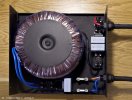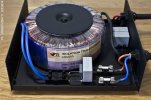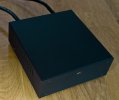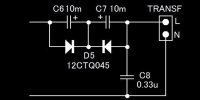But optimization first please, I want my bucks to be efficiently invested.Here's a solution for some of you...
Donate a few bucks!
-
Welcome to ASR. There are many reviews of audio hardware and expert members to help answer your questions. Click here to have your audio equipment measured for free!
You are using an out of date browser. It may not display this or other websites correctly.
You should upgrade or use an alternative browser.
You should upgrade or use an alternative browser.
Tripp Lite IS250 Review (Isolation Transformer)
- Thread starter amirm
- Start date
It's the ONLY way for this subject matter imo.I struggle with words but formulas do help me to understand things, that's why I'm encouraging this.
If you don't grasp the concept in a picture or diagram it imho is likely the equations will meaningless or ignored.
Much like when my wife gives me a chore.
What?
Then my friend, you are in the wrong place.But optimization first please, I want my bucks to be efficiently invested.
This is all about fun and BS'ing.
But for the price of an lp I can spend hours here getting scorn and ridicule heaped upon me. Lol
Worth every penny.
Are you an IT systems guy?
Yeah well... depends on your previous knowledge and perspective. To me, all these are models, and models are described by equations, concepts are often misleading. Besides, everybody uses a different language here, so when someone puts that into an equation, at least I can commit that to memory. Relations between variables in an equation don't lie. The rest...If you don't grasp the concept in a picture or diagram it imho is likely the equations will meaningless or ignored.
I was referring to the way money is spend to get storage for your pictures.Then my friend, you are in the wrong place.
Are you an IT systems guy?
Last edited:
Math is to an Engineer as the written word is to a historian.Yeah well... depends on your previous knowledge and perspective. To me, all these are models, and models are described by equations, concepts are often misleading. Besides, everybody uses a different language here, so when someone puts that into an equation, at least I can commit that to memory. Relations between variables in an equation don't lie. The rest...
I was referring to the way money is spend to get storage for your pictures.
I'm a rusty physicist, with half finished master degree in computer science that has been working with software engineers, particularity in the web environment, for more than a decade. This is why I like formulas and more or less know strategies to optimize webpages storage needs.
theREALdotnet
Major Contributor
- Joined
- Mar 11, 2022
- Messages
- 1,566
- Likes
- 2,774
Math is to an Engineer as the written word is to a historian.
So your question what “j” was is merely rhetorical? I thought so, but wasn’t sure. I came thissss close to actually answering it
So your question what “j” was is merely rhetorical? I thought so, but wasn’t sure. I came thissss close to actually answering it
No, more smart aleck in nature.
Never answer it, keep 'em guessing (but I doubt anyone is or even cares) lol
tjcinnamon
Addicted to Fun and Learning
- Joined
- Mar 20, 2021
- Messages
- 613
- Likes
- 272
Are there any brands worth looking at? My only requirement is a 12v Trigger and ideally a sequenced shutdown.
I have a Panamax 5300 but it’s older and a touch damaged. It makes a mild noise when up close which is unnerving.
I’m going for a less is more approach.
Would this support an Anthem 325, Rotel 976, and an AVR running two surround channels? I’ll be switching that one to a Hypex 252 8 channel on surround duty sooner than later.

 www.adafruit.com
www.adafruit.com
I have a Panamax 5300 but it’s older and a touch damaged. It makes a mild noise when up close which is unnerving.
I’m going for a less is more approach.
Would this support an Anthem 325, Rotel 976, and an AVR running two surround channels? I’ll be switching that one to a Hypex 252 8 channel on surround duty sooner than later.

Controllable Four Outlet Power Relay Module version 2
Say goodbye to hazardous high voltage wiring and create the Internet of Things with safe, reliable power control. The IoT Power Relay from Digital Loggers is custom designed ...
Last edited:
Vigovsky
Member
Hi all!
My new device IST-1 450VA for galvanic isolation for alternating voltage 230-240V.
This isolation transformer provides galvanic isolation. No conductive path is present between source and load.
This device blocks transmission of the DC component in AC and block interference caused by ground loops.
This device eliminates the hum of transformers in the circuits of connected amplifiers.
Well suited for low/medium power balanced circuits. In general, I gave a continuous load of 1000W for 10 minutes
and the transformer did not heat up very much. This idevice well suited for intermittent noise problems in the AC
leading to distortion of the current waveform in the AC.
My new device IST-1 450VA for galvanic isolation for alternating voltage 230-240V.
This isolation transformer provides galvanic isolation. No conductive path is present between source and load.
This device blocks transmission of the DC component in AC and block interference caused by ground loops.
This device eliminates the hum of transformers in the circuits of connected amplifiers.
Well suited for low/medium power balanced circuits. In general, I gave a continuous load of 1000W for 10 minutes
and the transformer did not heat up very much. This idevice well suited for intermittent noise problems in the AC
leading to distortion of the current waveform in the AC.
Attachments
Last edited:
I am at my wits end with some hum. Brand new house with LED recessed lighting on dimmers, more on this later, and code compliant arc fault ground fault breakers. Both 200 amp panels do have a slight hum you can hear with the doors open. I have amps by buckeye, outlaw(very little hum) and mccormick. All are nice and quiet when they are the only thing on. Once I turn on my processor / receiver (Anthem on one system Yamaha on the other) I get a buzz out of the speakers. The subs will also buzz too annoyingly. interestingly my fosi amps do not seem to be so afflicted with hum, however they power my atmos speakers that are less sensitive so I could just not be hearing it.
I have run a ground wire from amp to receiver connecting the chassis, this has greatly reduced the hum from the mccormick Yamaha system. the buckeye to AVM wire also reduced the hum. the AVM to outlaw wire didn't make a noticeable difference. The rotel power conditioner did nothing for the hum.
on a whim and a prayer, I tried Ferrite cores and a Hum X Ground Line Voltage Filter. I thought I had solved the dreaded hum! however it was late at night and the rest of the family was in bed. I had a few light fixtures on but the recessed lighting in the kitchen and hallways was off. The next evening the hum was back and that's when I realized it was only when the recessed lights were on, playing with the dimmer can have an effect on the hum, so I have removed a few of the dimmers that had the most noise. But it will not eliminate it like turning off the lights.
I had read that some of these LED lights can put DC noise on the mains and that's what the hum is, I have not been able to vet this hence why I am asking here. Would putting an Isolation Transformer before my processor help this specific issue? Removing 60+ cans and going to incandescent would be quite the endeavor to rid the hum.
I have run a ground wire from amp to receiver connecting the chassis, this has greatly reduced the hum from the mccormick Yamaha system. the buckeye to AVM wire also reduced the hum. the AVM to outlaw wire didn't make a noticeable difference. The rotel power conditioner did nothing for the hum.
on a whim and a prayer, I tried Ferrite cores and a Hum X Ground Line Voltage Filter. I thought I had solved the dreaded hum! however it was late at night and the rest of the family was in bed. I had a few light fixtures on but the recessed lighting in the kitchen and hallways was off. The next evening the hum was back and that's when I realized it was only when the recessed lights were on, playing with the dimmer can have an effect on the hum, so I have removed a few of the dimmers that had the most noise. But it will not eliminate it like turning off the lights.
I had read that some of these LED lights can put DC noise on the mains and that's what the hum is, I have not been able to vet this hence why I am asking here. Would putting an Isolation Transformer before my processor help this specific issue? Removing 60+ cans and going to incandescent would be quite the endeavor to rid the hum.
Vigovsky
Member
Yes, an Isolation Transformer should solve this problem.
However, the isolation transformer itself may produce some hum in this case.
If possible, it is advisable to place the Isolation Transformer further from the listening position along the AC voltage circuit.
However, the isolation transformer itself may produce some hum in this case.
If possible, it is advisable to place the Isolation Transformer further from the listening position along the AC voltage circuit.
Last edited:
I have a gear closet in the theater room. Deep enough to stand behind the rack, I will place it there.Yes, an Isolation Transformer should solve this problem.
However, the isolation transformer itself may produce some hum in this case.
If possible, it is advisable to place the Isolation Transformer further from the listening position along the AC voltage circuit.
HaveMeterWillTravel
Senior Member
It most like is radiated or conducted EMI/RFI noise from the dimmer circuits. Any mitigation will be best right at the source of the noise. I would try an LED circuit specific EMI filter first on the LED circuit, sometimes called a "lamp buzzing filter". I used Schaffner's FN2560 series successfully 5 or so years ago.I am at my wits end with some hum. Brand new house with LED recessed lighting on dimmers, more on this later, and code compliant arc fault ground fault breakers. Both 200 amp panels do have a slight hum you can hear with the doors open. I have amps by buckeye, outlaw(very little hum) and mccormick. All are nice and quiet when they are the only thing on. Once I turn on my processor / receiver (Anthem on one system Yamaha on the other) I get a buzz out of the speakers. The subs will also buzz too annoyingly. interestingly my fosi amps do not seem to be so afflicted with hum, however they power my atmos speakers that are less sensitive so I could just not be hearing it.
I have run a ground wire from amp to receiver connecting the chassis, this has greatly reduced the hum from the mccormick Yamaha system. the buckeye to AVM wire also reduced the hum. the AVM to outlaw wire didn't make a noticeable difference. The rotel power conditioner did nothing for the hum.
on a whim and a prayer, I tried Ferrite cores and a Hum X Ground Line Voltage Filter. I thought I had solved the dreaded hum! however it was late at night and the rest of the family was in bed. I had a few light fixtures on but the recessed lighting in the kitchen and hallways was off. The next evening the hum was back and that's when I realized it was only when the recessed lights were on, playing with the dimmer can have an effect on the hum, so I have removed a few of the dimmers that had the most noise. But it will not eliminate it like turning off the lights.
I had read that some of these LED lights can put DC noise on the mains and that's what the hum is, I have not been able to vet this hence why I am asking here. Would putting an Isolation Transformer before my processor help this specific issue? Removing 60+ cans and going to incandescent would be quite the endeavor to rid the hum.
Explanation:
Dimmable LED's are a screaming banshee in the EMC world, at least the PWM style. They do not actually 'dim' the LED, at least not in the traditional sense. Rather, the dimmer circuit will switch the power to them on and off fast enough the human eye perceives it as being continuously on. How bright they appear is a function of how long they are on relative to how long they are off. This on/off/on/off of current creates significant conducted and radiated EMI/RFI noise. Couple that with they tend to be cheaply made, the manufacture has not properly mitigated the noise so as to not affect other electronics around it. Outside of very old appliances with motors, such as a 1970s hair dryer or fan; they may be the largest source in the modern household. The main mitigation method decreases the rise/fall time of the current pulses.
When using a low bandwidth measurement device, such as a typical DMM one can measure a DC voltage on the line. But that is more of a limitation of the DMM, either a high bandwidth oscilliscope or RF spectrum analyzer would resolve it.
If you wanted to try something on the incoming power to your system, my standard "go to" EMI filter for single-phase is the Schaffner FN2090LL-20-08.
Last edited:
Count Arthur
Major Contributor
- Joined
- Jan 10, 2020
- Messages
- 2,944
- Likes
- 7,415
I am at my wits end with some hum. Brand new house with LED recessed lighting on dimmers, more on this later, and code compliant arc fault ground fault breakers. Both 200 amp panels do have a slight hum you can hear with the doors open. I have amps by buckeye, outlaw(very little hum) and mccormick. All are nice and quiet when they are the only thing on. Once I turn on my processor / receiver (Anthem on one system Yamaha on the other) I get a buzz out of the speakers. The subs will also buzz too annoyingly. interestingly my fosi amps do not seem to be so afflicted with hum, however they power my atmos speakers that are less sensitive so I could just not be hearing it.
I have run a ground wire from amp to receiver connecting the chassis, this has greatly reduced the hum from the mccormick Yamaha system. the buckeye to AVM wire also reduced the hum. the AVM to outlaw wire didn't make a noticeable difference. The rotel power conditioner did nothing for the hum.
on a whim and a prayer, I tried Ferrite cores and a Hum X Ground Line Voltage Filter. I thought I had solved the dreaded hum! however it was late at night and the rest of the family was in bed. I had a few light fixtures on but the recessed lighting in the kitchen and hallways was off. The next evening the hum was back and that's when I realized it was only when the recessed lights were on, playing with the dimmer can have an effect on the hum, so I have removed a few of the dimmers that had the most noise. But it will not eliminate it like turning off the lights.
I had read that some of these LED lights can put DC noise on the mains and that's what the hum is, I have not been able to vet this hence why I am asking here. Would putting an Isolation Transformer before my processor help this specific issue? Removing 60+ cans and going to incandescent would be quite the endeavor to rid the hum.
A DC blocker may help: https://www.audiosciencereview.com/...-dc-blocker-to-help-stop-transformer-hum.948/
I had a couple of mono amps, each with a fairly large ~700VA toroidal transformer, that would hum. The amount they hummed would vary, and no noise would come through the speakers, but you could hear the transformers humming inside the amps.
I built a DC blocker, along these lines, and it solved the issue: https://www.atlhifi.com/shop/fully-...blocker-trap-filter-2-pcs-us-type-ac-outlets/
Dennis_FL
Addicted to Fun and Learning
IMO, that would qualify as a defect and fixable by your contractor's new home warranty. The fixtures are defective.I am at my wits end with some hum. Brand new house with LED recessed lighting on dimmers, more on this later, and code compliant arc fault ground fault breakers. Both 200 amp panels do have a slight hum you can hear with the doors open. I have amps by buckeye, outlaw(very little hum) and mccormick. All are nice and quiet when they are the only thing on. Once I turn on my processor / receiver (Anthem on one system Yamaha on the other) I get a buzz out of the speakers. The subs will also buzz too annoyingly. interestingly my fosi amps do not seem to be so afflicted with hum, however they power my atmos speakers that are less sensitive so I could just not be hearing it.
I have run a ground wire from amp to receiver connecting the chassis, this has greatly reduced the hum from the mccormick Yamaha system. the buckeye to AVM wire also reduced the hum. the AVM to outlaw wire didn't make a noticeable difference. The rotel power conditioner did nothing for the hum.
on a whim and a prayer, I tried Ferrite cores and a Hum X Ground Line Voltage Filter. I thought I had solved the dreaded hum! however it was late at night and the rest of the family was in bed. I had a few light fixtures on but the recessed lighting in the kitchen and hallways was off. The next evening the hum was back and that's when I realized it was only when the recessed lights were on, playing with the dimmer can have an effect on the hum, so I have removed a few of the dimmers that had the most noise. But it will not eliminate it like turning off the lights.
I had read that some of these LED lights can put DC noise on the mains and that's what the hum is, I have not been able to vet this hence why I am asking here. Would putting an Isolation Transformer before my processor help this specific issue? Removing 60+ cans and going to incandescent would be quite the endeavor to rid the hum.
Vigovsky
Member
Speedskater
Major Contributor
My thoughts:
1] are all components plugged into the same outlet strip?
2] do all interconnects have a heavy braided shield?
3] a chassis to chassis wire is good.
4] ferrites work on interference above 100 kilohertz (that is higher than most LED's.
1] are all components plugged into the same outlet strip?
2] do all interconnects have a heavy braided shield?
3] a chassis to chassis wire is good.
4] ferrites work on interference above 100 kilohertz (that is higher than most LED's.
both systems have multiple 20amp circuits. I have played with plugging everything into the rotel power conditioner and it did not make a difference.My thoughts:
1] are all components plugged into the same outlet strip?
2] do all interconnects have a heavy braided shield?
3] a chassis to chassis wire is good.
4] ferrites work on interference above 100 kilohertz (that is higher than most LED's.
I am running blue jeans cables have to check on what shielding they claim
Thank you, this is great info!It most like is radiated or conducted EMI/RFI noise from the dimmer circuits. Any mitigation will be best right at the source of the noise. I would try an LED circuit specific EMI filter first on the LED circuit, sometimes called a "lamp buzzing filter". I used Schaffner's FN2560 series successfully 5 or so years ago.
Explanation:
Dimmable LED's are a screaming banshee in the EMC world, at least the PWM style. They do not actually 'dim' the LED, at least not in the traditional sense. Rather, the dimmer circuit will switch the power to them on and off fast enough the human eye perceives it as being continuously on. How bright they appear is a function of how long they are on relative to how long they are off. This on/off/on/off of current creates significant conducted and radiated EMI/RFI noise. Couple that with they tend to be cheaply made, the manufacture has not properly mitigated the noise so as to not affect other electronics around it. Outside of very old appliances with motors, such as a 1970s hair dryer or fan; they may be the largest source in the modern household. The main mitigation method decreases the rise/fall time of the current pulses.
When using a low bandwidth measurement device, such as a typical DMM one can measure a DC voltage on the line. But that is more of a limitation of the DMM, either a high bandwidth oscilliscope or RF spectrum analyzer would resolve it.
If you wanted to try something on the incoming power to your system, my standard "go to" EMI filter for single-phase is the Schaffner FN2090LL-20-08.
I have one headed my way, fingers crossed this is what my issue is!A DC blocker may help: https://www.audiosciencereview.com/...-dc-blocker-to-help-stop-transformer-hum.948/
I had a couple of mono amps, each with a fairly large ~700VA toroidal transformer, that would hum. The amount they hummed would vary, and no noise would come through the speakers, but you could hear the transformers humming inside the amps.
I built a DC blocker, along these lines, and it solved the issue: https://www.atlhifi.com/shop/fully-...blocker-trap-filter-2-pcs-us-type-ac-outlets/
Similar threads
- Poll
- Replies
- 112
- Views
- 17K
- Replies
- 11
- Views
- 783
- Replies
- 4
- Views
- 865



